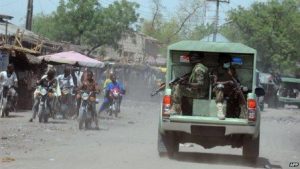Pressure mounting on African govt’s to destroy Boko Haram

[media-credit name=”AFP” align=”alignleft” width=”300″] [/media-credit]
[/media-credit]
While some people would like to quickly equate the extremist actions of the so-called ISIS terrorist group with the Islamic faith, the carnage that a similar terrorist organization—Boko Haram–is inflicting on its people goes on. Read: Why Calling ISIS Islamic Only Plays Into Its Hands
This debate is even more intense vis-à-vis Boko Haram, a group that is bent on the imposition of Sharia law in Northern Nigeria.
John Campbell, a former U.S. Ambassador to Nigeria provides a comparison between the two groups. In ISIS and Boko Haram, Campbell thinks, “The relationship, if any, between Nigeria’s Boko Haram and ISIS is a question that vexes the policy community’”
In sub-Saharan Africa, three nations; Nigeria, where Boko Haram originated, Cameroon and Chad–are all in the throes of the carnage which the group has caused. Already, thousands of people have been maimed, or killed as a result. The carnage, destruction which the group has caused and continues to cause, goes on.
Concern is mounting in the region and around the world.
Nigeria especially, considered an economic powerhouse, and with a military that is capable of extinguishing the group, bears the brunt of the blame for failing to recognize the dangers posed from the outset. Its president, Goodluck Jonathan has been criticized, rightly or wrongly, for a failed strategy which has left the group to operate with impunity.
Speaking about the recent events in Nigeria on CNN Newsroom, February 28, former New Mexico Governor, Bill Richardson blasted the Nigerian government, describing their inability to adequately deal with the Boko Haram situation as ‘inept.”
An American missionary Phyllis Sorter was reportedly kidnapped in Lagos in February and it is said that the group responsible demanded a $300,000 random before she could be released.
“But my hope is that the families, the organization, use the U.S. government, because the Nigerian government is virtually helpless in many of the kidnapping cases. They are either inept or they’re not cooperating with anyone.”
In an interesting read for The Atlantic, Matt Schiavenza wonders “Why Nigeria Was Able to Beat Ebola, but Not Boko Haram”
Jonathan is currently facing a tough re-election campaign against former military ruler, Mohamadu Buhari. Originally scheduled for February 4, the elections were postponed to March 28 after fears they would be disrupted by Boko Haram.
The Washington Post questioned that decision to postpone, saying, “But after years of Boko Haram’s carnage, what will the army do in six weeks that they couldn’t do in five years and with a $5 billion security budget?”
It appears the fight to change the tide may have started in earnest.
With an election hanging in the balance, and with Chad and Cameroon now embroiled in the attacks, the U.S. military has stepped-in to assist in new ways. US Sends Cameroon Equipment to Fight Boko Haram
NBC News reports, “Amid growing international alarm, the four nations of the Lake Chad region — Chad, Niger, Cameroon and Nigeria — plus neighboring Benin are preparing a joint task-force of 8,700 men to take on the Sunni jihadist group.“
